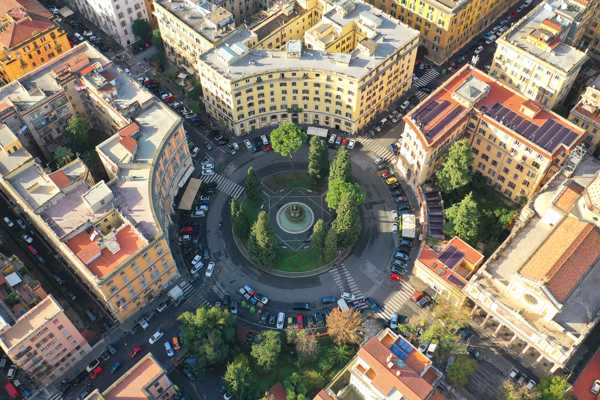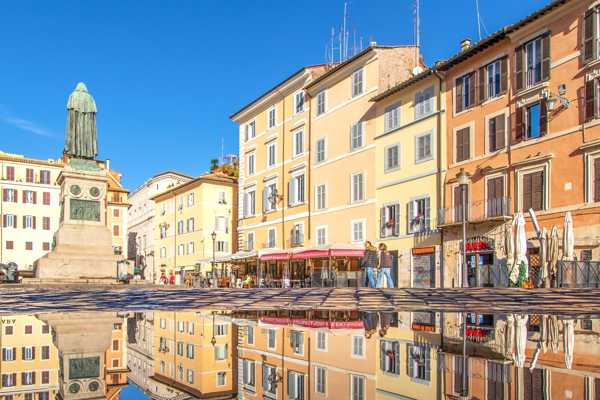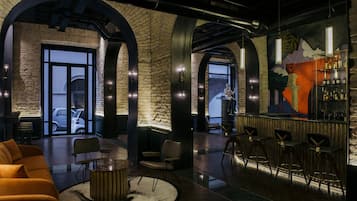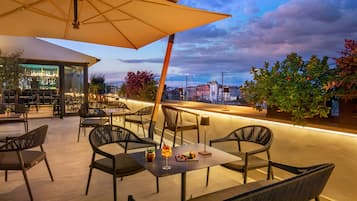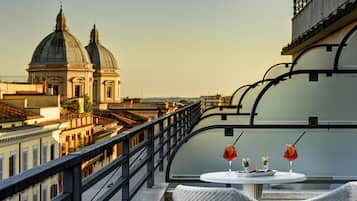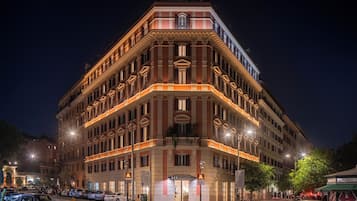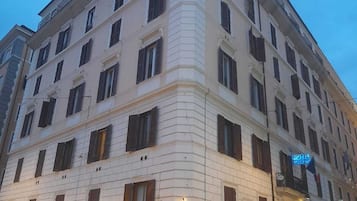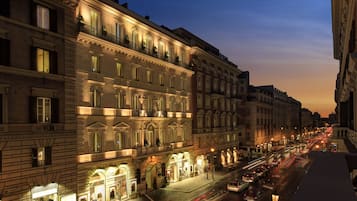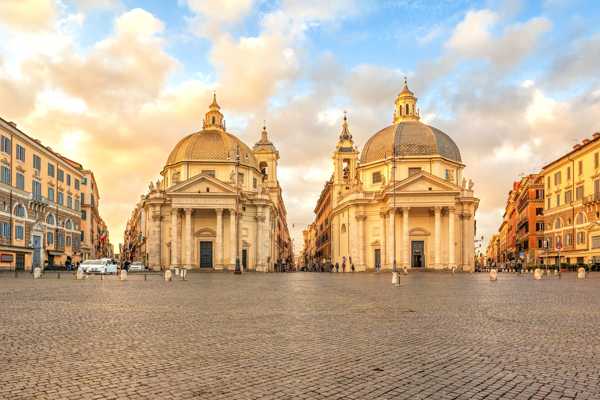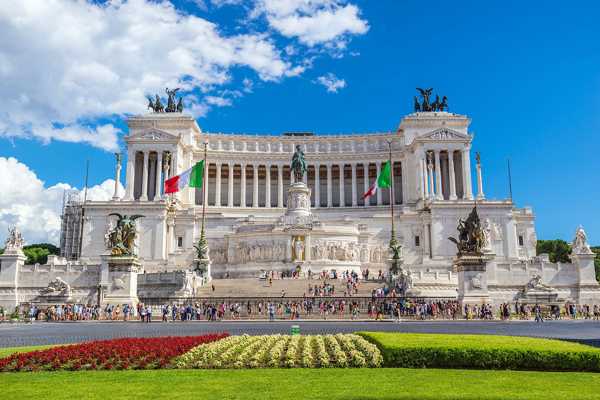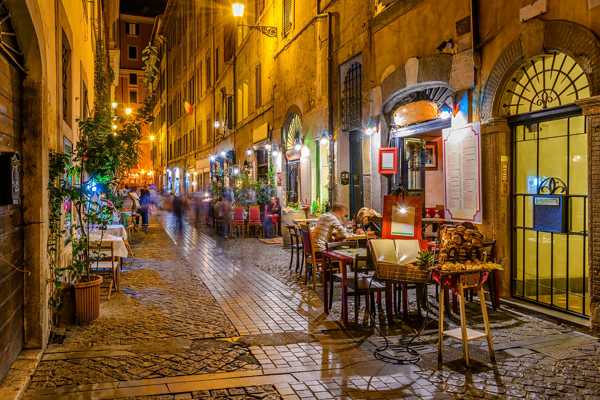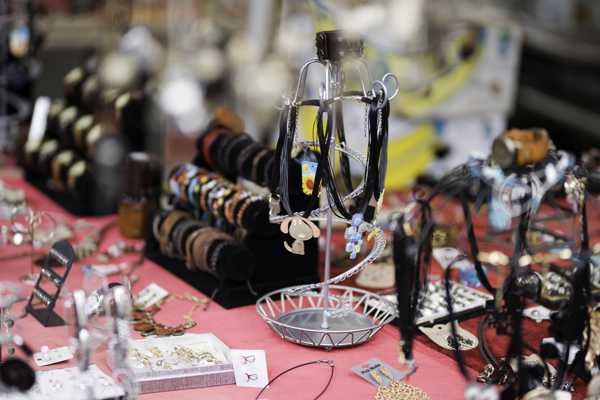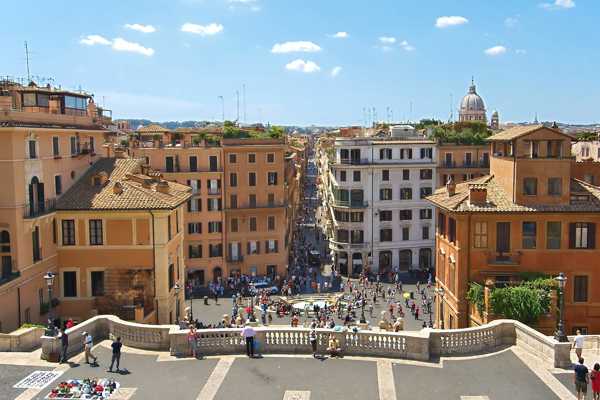The most popular neighbourhoods in Rome imbue the Italian metropolis with irresistible charm and character. The city brims with historical and architectural wonders, with its cobblestone streets lined with ancient ruins, majestic cathedrals, and evocative palaces.
Knowing where to stay in Rome can be a challenge, as no 2 neighbourhoods are the same. This guide runs through some of the most amazing, from the grand facades of Prati and the rich collections of Vaticano all the way to the ramshackle romance of La Trastevere.
- 1
Trastevere
Get the romance flowing and the wine poured
- Sejarah
- Hiburan malam
- Foto
Baca selanjutnyaTrastevere is an incredibly romantic neighbourhood that lies south and west of the Tiber, around a 30-minute stroll through the heart of ancient Rome from the Colosseum. Once the city's Jewish Quarter, it's one of the most higgledy-piggledy parts of town, with narrow alleys going this way and crooked cobbled lanes going that. It's a real joy to wander and get lost in.
The heart of the area is anchored on the Basilica of Our Lady in Trastevere, which fronts a take-photos-of-me piazza. From there, the streets wind off in a medley of osteria wine bars, bookshops, and cafes strewn with ivy. Above Trastevere on the hill is the Orto Botanico di Roma, a place to escape the buzz and scale to lookouts that gaze across to the Vatican.
Peta - 2
Centro Storico
Packed full of stunning architecture and plenty of shopping
- Makanan
- Sejarah
- Pembeli-belah
Baca selanjutnyaThe Centro Storico is the part of Rome you're probably dreaming of when you flick through the travel brochures. It occupies the very middle of the medieval city, ranging from the Piazza del Popolo in the north to the Ponte Sisto in the south. Within are some of the most iconic landmarks in Europe – the Pantheon and its great tombs, the gurgling Trevi Fountain, the Spanish Steps.
But the Centro Storico is no museum piece. People live, work, and – most importantly – play amid its maze-like streets. You can check out the meat and fish and flower markets of the Campo de' Fiori every day, or head to the vast Piazza Navona to drink Umbrian wines after dark. There are the shopping strips of Via del Corso, Rome's Oxford Street, and more churches than you can shake a deep-fried artichoke at.
Peta - 3
Garbatella
Off-the-beaten-track blocks from the 1920s
- Bajet
- Makanan
Baca selanjutnyaGarbatella can sometimes seem like a city within a city. It lies directly south of the main urban heart of Rome and landmarks like the Colosseum – 2 stops on the metro should do it. But it looks nothing like its neighbouring district of Centro Storico. Instead of narrow lanes and old stone pavements, this one is all tenement blocks and wide boulevards.
The truth is that Garbatella is one of the youngest neighbourhoods in the Eternal City. It was founded in 1920 as a fully planned urban housing project built around a central park. In the last few decades, it's become something of an off-beat alternative to the tourist areas, offering street-side pasticceria (pastry shops) and noir cocktail bars.
Peta - 4
Monti
Hidden cafes with views of the Colosseum
- Makanan
- Sejarah
- Foto
Baca selanjutnyaMonti forever struggles to stay out of the spotlight, but still offers one of Rome's best cafe cultures and boho bar scenes. You'll find it wedged between the Colosseum and the gritty streets around Termini Station to the north, spilling down a hillside through pine-topped parks and little piazzas.
Probably the most enchanting parts of Monti come at the intersection of Piazza degli Zingari and the Via degli Zingari and then to the south of those. Go there to find an endless array of ice-cream outlets, pizza-touting holes in the wall and coffee joints serving espressos on the age-stained cobbles. Also don't miss the Parco del Colle Oppio. It's got grassy lawns with some of the best views of the Colosseum, and a mix of ancient monuments that not many people take the time to see.
Peta - 5
Termini
The raw energy of Rome straight off the train
- Bajet
- Foto
Baca selanjutnyaTermini is the area named after the great train station of Rome, Termini Station. It spreads north and south of the platforms on the eastern side of the central city, through regimented blocks topped by high apartment buildings. It's always alive with things to see and eat, but also has a gritty and raw side.
North of the main station, streets like Via Marghera shoot past loads of low-key and affordable pasta restaurants. They also host bargain hostel stays and backpacker bars. To the south, the neighbourhood gets overshadowed by the colossal Termini building, but still manages the jaw-dropping grandeur of Repubblica plaza, which is a fitting welcome for those fresh off the trains.
Peta - 6
Tridente
A vibrant shopping and dining thoroughfare
- Foto
- Pembeli-belah
Baca selanjutnyaTridente is formed by a trio of Rome's great thoroughfares. Starting at Piazza del Popolo, it spreads south, west and east on the Via di Ripetta, Via del Babuino, and the bustling Via del Corso, capped off on its southern end by the chic shopping area of Via dei Condotti – think Gucci and Gabbana galore.
The area encompassed by these 3 great roadways is home to the Rome of La Dolce Vita, a land where the turquoise waters of the Trevi Fountain babble down 1 alley and the carved stones of the Spanish Steps loom above the next piazza. This is a place for jewellery shopping and sipping prosecco on the sidewalks.
Peta - 7
Prati
A refined quarter where dining and nightlife options are in good supply
- Makanan
- Hiburan malam
- Foto
Baca selanjutnyaPrati is the grander, more modern side of Rome. It lies on the west bank of the Tiber across from Centro Storico, with the Vatican looming on one side and the hills of the Villa Borghese parklands on the other. The district is known for its Art Nouveau architecture, gilded palazzos, and manicured parks.
There are some must-see historical remnants, like the Museum of the Ara Pacis and the great bulwarks of the Castel Sant'Angelo. However, lots of visitors will all but forget about those the moment they see the wealth of cocktail bars and chic drinking lounges that awaits, especially if it's the weekend.
Peta - 8
Ostia
The historic port and main beach district of Rome
- Sejarah
- Foto
Baca selanjutnyaOstia is the only area of Rome to sit on the coast. It's about 15 miles to the southwest of the Vatican, spreading up the side of the Tyrrhenian Sea with its port-side blocks of flats and softly sloping beaches.
Lots of people escape to Ostia when the weather's hot in the midsummer, but the sands and the waves still aren't the main draw of the district. That honour has to go to the ancient archaeological complex of Ostia Antica, which spreads over the cypress-spotted hills above the mouth of the Tiber. Once the main port for ancient Rome, it sports half-ruined theatre houses and 2,000-year-old apartments.
Peta - 9
Vatican City
Explore some of the best museums in the world

- Sejarah
Vatican City isn't strictly in Rome at all. Officially it's an independent city-state, complete with its own borders and government. But the Italian capital rolls around its mighty monuments on all sides, with the districts of Prati and Borgo, as well as the Tiber River, within walking distance.
There are 2 main reasons to come to Vatican City – for an audience with the Pope or to delve into the Vatican Museums. The latter is among the richest collections on Earth. They host priceless masterworks by the likes of Giovanni Bellini, Raphael, Caravaggio and Leonardo da Vinci. Be warned, though, there's simply too much to get through in a single day.
Peta - 10
San Lorenzo
Interesting neighbourhood with moody street art and happening nightlife
- Hiburan malam
- Foto
Baca selanjutnyaSan Lorenzo is an intriguing place, scattered with ruined buildings – it was one of the few parts of Rome to be hit by bombings in WWII – and scrawled with moody street art. It lies east and south of Termini Station, away from the big crowds and monuments.
However, San Lorenzo is anything but sleepy. It's become something of a nightlife hub for local Italian students and professionals, offering pumping Euro disco clubs and underground wine bars in old cellars. For a moment's peace, you can always head to the massive Campo Verano, a seemingly endless cemetery that's packed with monumental tombs on a hill to the east.
Peta - 11
Testaccio
One of Rome's best dining and nightlife neighbourhoods
- Pasangan
- Makanan
- Kumpulan
- Hiburan malam
Baca selanjutnyaTestaccio has a rich history in the trade of fresh produce from all over Italy. Its great food culture followed suit, being home to great home-style cuisine, including most of Italy’s traditional offal dishes. Check out the 19th-century Checchino dal 1887 for some of Testaccio’s authentic fare.
The neighbourhood has a local party scene, featuring live music and packed dance floors. You can try hopping from one disco to another. Resident DJs at Radio Londra spin funky house music until late.
Peta



